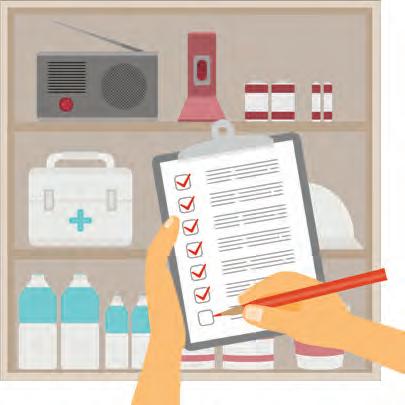
3 minute read
SEVERE WEATHER PREPARATION
from July 2023 Dixie
Severe weather can happen anytime, anywhere in the state. This can include dangerous conditions such as strong winds, thunderstorms, tornadoes, hail, flooding, and hurricanes. These weather events can be unpredictable and extremely risky. It is important to understand the kind of hazardous weather that could affect you.
TORNADOES:
Tornadoes are powerful swirling winds that extend from thunderstorms and touch the ground. They can wreck buildings, flip cars, and send dangerous debris flying.
PREPARING FOR A TORNADO:
To prepare for a tornado, there are important steps you can take. Stay informed by receiving alerts from your community's warning system. Utilize resources like the Emergency Alert System (EAS) or NOAA Weather Radio to stay updated on emergency information. If your area has sirens, learn to recognize their warning sound. Additionally, keep a close watch on weather reports, as meteorologists can provide valuable predictions about tornado conditions.
Identify a safe place where you can seek shelter if a tornado strikes. The best option is a "safe room" constructed according to FEMA guidelines. If you don't have access to a safe room, choose a small interior room within your home that does not have windows. Alternatively, if you have a basement, it can provide a secure location as well. Remember to consider your pets in your emergency plan, as they are part of your family.
Furthermore, gather essential emergency supplies in advance. Stock up on nonperishable food, water, medical items, and any necessary medications. These supplies will be valuable if you need to remain at home or take shelter for an extended period. By following these preparations, you can increase your readiness and protect yourself and your loved ones during a tornado situation.
FLOODS:
In Alabama, flooding is the second most common natural hazard. If you don't leave flooded areas or go into the water, you could get seriously hurt or stranded.
PREPARING FOR A FLOOD:
To prepare for a flood, there are several important steps you can take. First, find out if your area is at risk of flooding by checking FEMA's Flood Map Service. It's also a good idea to sign up for your community's warning system and stay updated with emergency alerts from the alert systems previously mentioned.
Next, consider getting flood insurance because regular homeowners' insurance policies do not cover flood damage. Flood insurance usually takes about 30 days to take effect, so it's best to purchase or renew your policy well in advance of any potential disaster.
It's crucial to have a plan for your household, including your pets, in case of a flood. Make sure everyone knows what to do, where to go, and what supplies you will need to stay safe during a flood. Learn the evacuation routes, identify shelter options, and understand how to respond to flash floods. Additionally, gather essential supplies such as non-perishable food, cleaning items, and enough water for several days in case you need to leave immediately or if services are disrupted in your area.
Keep important documents in a waterproof container and create password-protected digital copies to safeguard them. Take steps to protect your property by moving valuable items to higher levels.
HURRICANES:
Even though experts say this year's Atlantic hurricane season might be less severe than usual, it's still important to be ready and take safety measures. Storms can be hard to predict, so it's better to be prepared and take action instead of being careless.
PREPARING FOR A HURRICANE:
When preparing for a hurricane in advance, there are some important steps you should take. First, make sure you have a family hurricane safety plan in place or update the one you already have. It's a good idea to know the safe routes to travel in case you need to evacuate. Find out where the official shelters are located in your area so you know where to go if necessary. Another important step is to make sure you have enough nonperishable food and water stocked up. These supplies will come in handy if you're unable to leave your home or if there are power outages during the storm. By being prepared and taking these precautions, you can help keep yourself and your loved ones safe during a hurricane.
In the event of a hurricane, consider covering your windows and doors with plywood. It helps protect your home from strong winds and flying debris. Another important step is to put together a disaster supply kit. It's also a good idea to bring lightweight objects inside your home to prevent them from being blown away during the storm. Make sure to fuel up your family vehicles and get them serviced so they're ready to go if you need to evacuate. Lastly, it's a good idea to have some extra cash on hand in case there are power outages and you're unable to use electronic payment methods. Taking these precautions can help keep you and your family safe during a hurricane.
3-DAY SUPPLY OF WATER (1 GALLON PER PERSON PER DAY)
NON-PERISHABLE FOOD
PRESCRIPTION MEDICINES
TOILETRIES
FIRST AID KIT
BAT TERY-POWERED RADIO
FLASHLIGHT, EXTRA BATTERIES
EXTRA SET OF CLOTHING/ SHOES (FOR EACH PERSON)
ONE BLANKET OR SLEEPING BAG (PER PERSON)
MANUAL CAN OPENER
SPECIAL ITEMS FOR INFANTS, ELDERLY, OR DISABLED FAMILY MEMBERS.
Have the following sealed in a moisture-proof package:
Identification
VALUABLE PAPERS
EXTRA MONEY/CREDIT CARD









